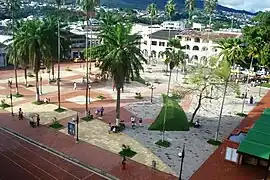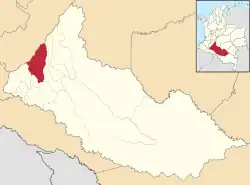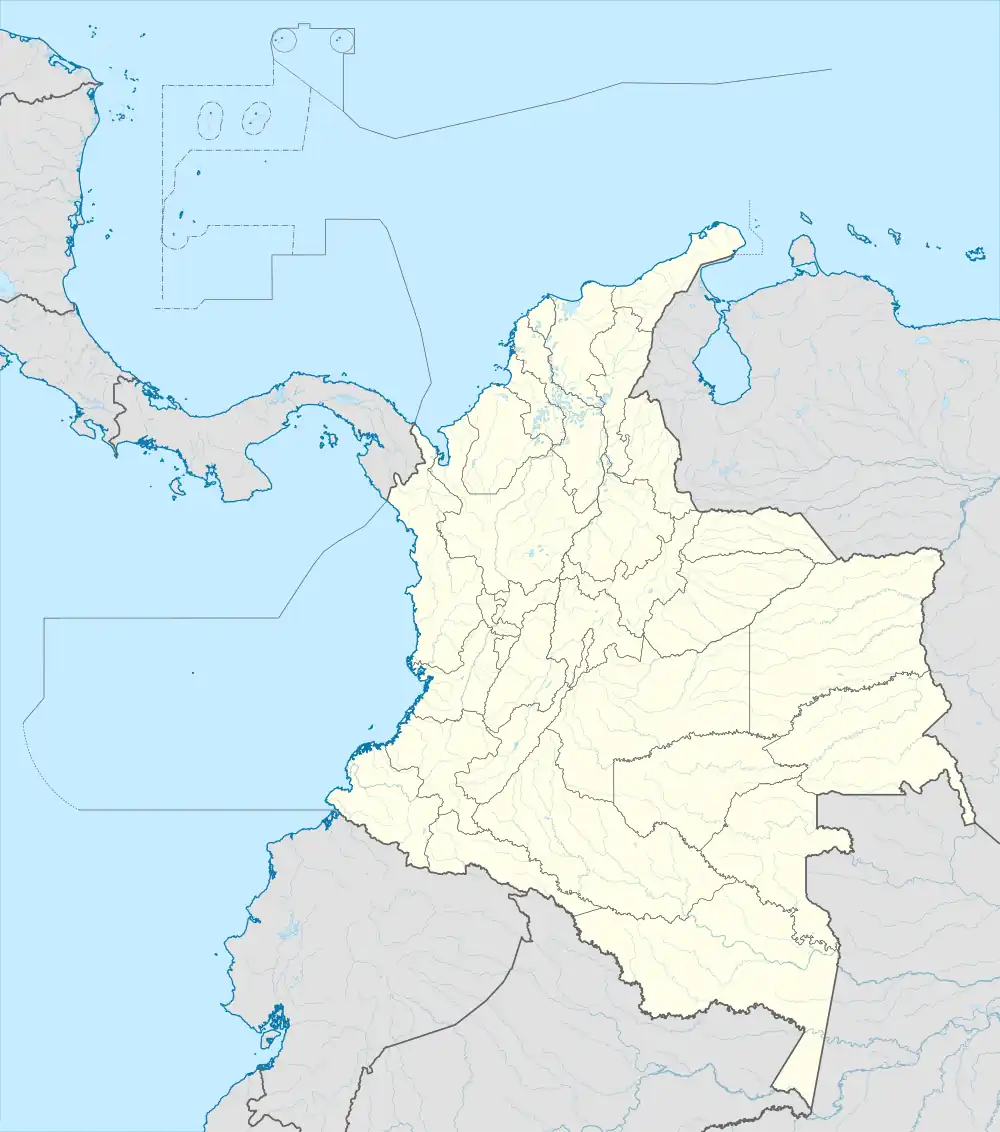Florencia, Caquetá
Florencia (Spanish pronunciation: [floˈɾensja], English: Florence) is a municipality and capital city of the Department of Caquetá, Colombia. It's the most populous city in the Amazon Region of Colombia. It lies on the Orteguaza River which flows into the Caqueta River. It's population is 168,346 in 2018.[3]
Florencia | |
|---|---|
Municipality and city | |
     Top: View of Plaza Pizarro, Second: A sightseeing boat at Biblioteca River, Third: House of the Episcopal Curia, Four: Gustavo Artunduaga Paredes Airport Bottom: Piedmont of Florencia | |
.svg.png.webp) Flag .svg.png.webp) Seal | |
| Nickname: Golden Gate to the Colombian Amazonia | |
 Location of the municipality and town of Florencia in the Caquetá Department of Colombia. | |
 Florencia Location in Colombia | |
| Coordinates: 1°36′50″N 75°36′46″W | |
| Country | |
| Region | Amazonas Region |
| Department | Caquetá Department |
| Founded | 1902 |
| Incorporated | 1912 |
| Founded by | Doroteo de Pupiales |
| Named for | Florence |
| Government | |
| • Mayor | María Susana Portela |
| Area | |
| • Municipality and city | 2,548 km2 (984 sq mi) |
| • Urban | 20.21 km2 (7.80 sq mi) |
| Elevation | 242 m (794 ft) |
| Population (2018)[1] | |
| • Municipality and city | 168,346 |
| • Rank | 35th in Colombia |
| • Density | 66/km2 (170/sq mi) |
| • Urban | 147,939 |
| • Urban density | 7,300/km2 (19,000/sq mi) |
| • Rural | 21,519 |
| DANE | |
| Demonym(s) | Florencian florenciano (m), -na (f) florentino (m), -na (f) |
| Ethnicity | |
| • White/Mestizo | 95.9% |
| • Afro | 3.3% |
| • Amerindian | 0.8% |
| Time zone | UTC-05 (Colombia Standard Time) |
| Postal code | 180001–180009 |
| Area code | 57 + 8 |
| Major airport | Gustavo Artunduaga Paredes Airport |
| Website | Official website (in Spanish) |
Etymology
The name of the city pays homage to an Italian businessman dedicated to the rubber trade, Paolo Ricci, from the city of Florence.[4]

History
The area where Florencia is located was inhabited by tribes of the Andaquí ethnic group.[5] The territory where the city is located was also inhabited by Witoto and Coreguaje tribes. In 1542, the territory was explored for the first time by the Spanish conquistador, Hernán Pérez de Quesada.[6] Florencia was founded on December 25, 1902 by Capuchin Friar Doroteo De Pupiales (1876-1959) Born in Pupiales, Nariño, Colombia. Rubber plantations around several areas of what is now known as the department of Caqueta encouraged the creation of the city next to the Hacha River.[7] The city became an important site after the creation of the trail between the settlement and the town of Guadalupe in what is now the department of Huila.[7]
Geography
Florencia is located at the foot of the Cordillera Oriental mountain range. The municipality of Florencia limits to the north with the Huila Department and the municipality of El Paujil, to the east with the municipalities of El Paujil and La Montañita, to the south with the municipalities of Milán and Morelia, and to the west with the municipality of Belén de Andaquies and the Huila Department.
Climate
Florencia has a tropical rainforest climate (Köppen Af), and experiences significant rainfall during the course of the year. There is still a large amount of rainfall, even in the driest month. The average temperature in Florencia is 26.1 °C or 79.0 °F. In Florencia, January is the driest month, while June tends to be the wettest month. About 3,840 millimetres or 150 inches of rain falls annually during the year.
| Climate data for Florencia (Caquetá) | |||||||||||||
|---|---|---|---|---|---|---|---|---|---|---|---|---|---|
| Month | Jan | Feb | Mar | Apr | May | Jun | Jul | Aug | Sep | Oct | Nov | Dec | Year |
| Average high °C (°F) | 32.7 (90.9) |
31.9 (89.4) |
30.8 (87.4) |
30.1 (86.2) |
29.9 (85.8) |
28.7 (83.7) |
28.5 (83.3) |
29.9 (85.8) |
30.6 (87.1) |
31.2 (88.2) |
31.5 (88.7) |
32.0 (89.6) |
30.7 (87.2) |
| Average low °C (°F) | 21.8 (71.2) |
21.9 (71.4) |
21.7 (71.1) |
21.5 (70.7) |
21.3 (70.3) |
21.0 (69.8) |
20.8 (69.4) |
20.9 (69.6) |
21.2 (70.2) |
21.7 (71.1) |
21.8 (71.2) |
21.8 (71.2) |
21.5 (70.6) |
| Average rainfall mm (inches) | 119 (4.7) |
191 (7.5) |
296 (11.7) |
382 (15.0) |
471 (18.5) |
503 (19.8) |
461 (18.1) |
356 (14.0) |
329 (13.0) |
325 (12.8) |
254 (10.0) |
153 (6.0) |
3,840 (151.1) |
| Average relative humidity (%) | 82 | 83 | 86 | 87 | 89 | 89 | 88 | 87 | 87 | 85 | 86 | 84 | 86 |
| Mean monthly sunshine hours | 157.5 | 109.9 | 102.5 | 82.0 | 106.4 | 95.9 | 104.1 | 123.4 | 135.4 | 141.9 | 146.8 | 149.6 | 1,455.4 |
| Source: IDEAM[8] - Gobernación de Caquetá[9] | |||||||||||||
Economy
According to a report of the first half of 2022 by the MinCIT, the main economic activities of the city were Trade and repair of vehicles with 22.6%, followed by Public Administration and Defense with 18.8% and third, Artistic Activities with 10.9%.[10]
Heritage Sites
- El Encanto Petroglyphs: These petroglyphs are located to the left of the Hacha River near Barrio Torasso. The engravings are approximately 16 meters long.[11] They were first described by archaeologist Eliécer Silva Celis in 1963. Among the petroglyphs are Zoomorphic and Human figures.[12]
- Curiplaya Building: A historic building of colonial architecture built in the 1950s. This building served as a hotel, currently it houses some cultural entities of the municipality and the department.[13] In addition it is the headquarters of the Palace of Culture and Fine Arts of the Amazon (Spanish: Palacio de la Cultura y Bellas Artes de la Amazonía).[14] The building was declared a national cultural property in 2000 by the Colombian Ministry of Culture.[15] The name "Curiplaya" means "Golden Beach" in the Witoto language.[14]
References
- https://www.dane.gov.co/files/varios/informacion-capital-DANE-2019.pdf
- National Administrative Department of Statistics - DANE (2005). "Perfil Municipal de Florencia - Censo 2005" (PDF). Retrieved 13 January 2012.
- https://www.dane.gov.co/files/varios/informacion-capital-DANE-2019.pdf
- Caquetá: características geográficas (in Spanish). Instituto Geográfico Agustín Codazzi, Subdirección de Geografía y Cartogafia. 2010. ISBN 978-958-8323-37-4.
- Bustos, Mauricio. "La Red Cultural del Banco de la República". Banrepcultural (in Spanish). Retrieved 2022-07-31.
- Diez festivales en Colombia: Valores e impacto (in Spanish). Edtitorial Pontificia Universidad Javeriana. 2013-02-22. ISBN 978-958-716-785-6.
- Niño, Oscar Arcila; León, Gloria González; Rey, Franz Gutiérrez; Salazar, Adriana Rodríguez; Salazar, Carlos Ariel (2002-04-02). Caquetá, Construcción de un territorio amazónico en el siglo XX (in Spanish). Instituto Amazónico de Investigaciones Científicas "SINCHI". ISBN 978-958-96878-1-9.
- Instituto de Hidrología, Meteorología y Estudios Ambientales. "IDEAM - Climatografía de la principales ciudades" (in Spanish). Retrieved 13 November 2010.
- Gobernación de Caquetá. "Estaciones Meteorológicas del Caquetá" (PDF) (in Spanish). Retrieved 17 January 2011.
- "Perfiles Económicos Departamentales - Caquetá". Colombian Ministry of Commerce (in Spanish). 2022. Retrieved 2022-08-02.
- "Arqueología - Caquetá". Sistema Nacional de Información Cultural (in Spanish). Retrieved 2022-07-31.
- Lizarazo, María (2022-05-10). "El arte rupestre de la Amazonia que está en riesgo de perderse". El Espectador (in Spanish). Retrieved 2022-07-31.
- "Guía departamental del Caquetá (CITUR)" (PDF). Centro de Información Turística de Colombia (in Spanish). p. 42. Retrieved 2022-08-05.
- Arias, Gloria (2016-07-27). "Conozca las maravillas naturales del Caquetá". El Tiempo (in Spanish). Retrieved 2022-08-05.
- "Lista de Bienes declarados Bien de Interés Cultural de Ámbito Nacional" [List of Properties declared of Cultural Interest at the National Level] (PDF). Colombia Ministry of Culture. 2020. Retrieved 2022-08-05.
External links
![]() Media related to Florencia at Wikimedia Commons
Media related to Florencia at Wikimedia Commons
- (in Spanish) Alcaldía Municipal de Florencia en Caquetá Archived 2018-10-26 at the Wayback Machine
- (in Spanish) Florencia official website
- (in Spanish) Government of Caqueta; Florencia
- (in Spanish) Portal Positivo del Caquetá
- (in Spanish) Clasificados del Caquetá